★★★★
“What is this? A Japanese manga? Or a Luc Besson film?”

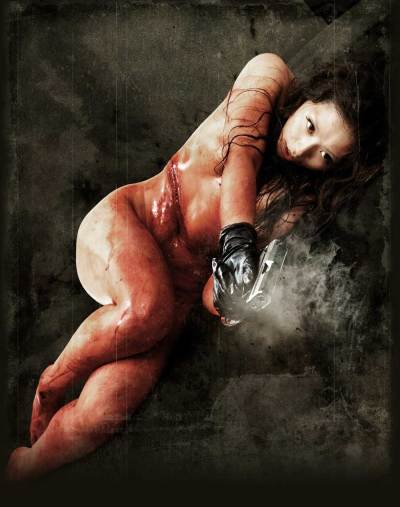 The above line is spoken by one character to another during one of the more outrageous plot twists – in reality, this is neither, but it’s an accurate assessment of this exercise in excess. It starts with a woman being shot in the shower, the assassin (Miller) and his partner head for Vegas, and on the trip, he tells the strange story of Mayumi (Asami, previously seen in The Machine Girl and the Yakuza Hunter films). A meth-head at the time, she was bought by a doctor (Narita), seeking revenge on Hamazaki (Kamata), the depraved, but very rich, sicko who raped and killed the doctor’s wife, because he blamed the doctor for the death of Hamazaki’s father. The sicko is particularly fond of necrophilia, and makes regular trips to a remote establishment where he can indulge the fetish. The doctor’s plan involves training Mayumi as an assassin, getting her brought into the corpse pleasure park after inducing a catatonic state with drugs, then letting her rampage her way through the establishment to Hamazaki. Oh, and the only way she can get a weapon in, is if the pieces are surgically inserted into her body first. Well, except for the magazine. No surgery needed for that, if you know what I mean, and I think you do.
The above line is spoken by one character to another during one of the more outrageous plot twists – in reality, this is neither, but it’s an accurate assessment of this exercise in excess. It starts with a woman being shot in the shower, the assassin (Miller) and his partner head for Vegas, and on the trip, he tells the strange story of Mayumi (Asami, previously seen in The Machine Girl and the Yakuza Hunter films). A meth-head at the time, she was bought by a doctor (Narita), seeking revenge on Hamazaki (Kamata), the depraved, but very rich, sicko who raped and killed the doctor’s wife, because he blamed the doctor for the death of Hamazaki’s father. The sicko is particularly fond of necrophilia, and makes regular trips to a remote establishment where he can indulge the fetish. The doctor’s plan involves training Mayumi as an assassin, getting her brought into the corpse pleasure park after inducing a catatonic state with drugs, then letting her rampage her way through the establishment to Hamazaki. Oh, and the only way she can get a weapon in, is if the pieces are surgically inserted into her body first. Well, except for the magazine. No surgery needed for that, if you know what I mean, and I think you do.
Yes, this is as totally mad as it sounds, and you have to wonder, might there have been an easier way to get vengeance? Mind you, the doctor is hardly any more sane than Hamazaki, with the Hippocratic Oath going right out the window. Anyhow, Asami literally doesn’t say a single word during the entire movie, and is completely naked for almost the entire second half, as she tries to complete the mission, taking out the guards at Club Necro in hand-to-hand combat. This is also rather less sexy than it sounds, because she’s also drenched in her own blood, after ripping the gun parts from her torso. [The doctor kindly informed Mayumi she would have 22 minutes to reach the first-aid waiting outside, before she bled to death from her self-inflicted wounds, so there’s a bit of a desperate time-crunch here.] But it’s still undeniably entertaining, if you can handle the copious gore, with good performances from all the principals, and a script which comes full circle nicely – the opening killing turns out to be pivotal to the way things turn out as well.
This was definitely more than I expected, though admittedly, after the last few Zero Woman films, those expectations were not much above room temperature. Mitsutake has much the same budgetary limitations, but does a very good job of working within them, to create a movie that knows it has to find something different to stand out, and succeeds in doing just that. Say what you will – you won’t forget this one in a hurry! Asami continues to be among the most impressive of the J-gore actresses I’ve seen, and the news, after the end credits, that Gun Woman Will Return, can only be something to be anticipated by this site.
Dir: Kurando Mitsutake
Star: Asami, Kairi Narita, Matthew Miller, Noriaki R. Kamata





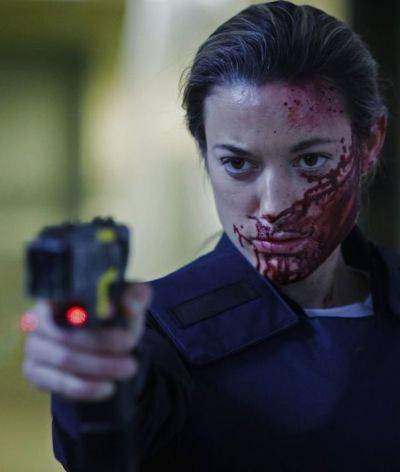
 The main mission given to Rie (Shiratori this time) is a little bit different, from her usual, straight-forward assassinations. Instead, she’s given the job of protecting a witness. Nana (Matsuda), the disgruntled mistress of an organ-trafficking ring, who has had enough and agreed to co-operate with the police. Rie is part of the protection detail, but soon finds out that the gangsters, under ever-so strange boss Kaneda (Nogami) with his transvestite tendencies, are not going to sit back and wait for Nana to take the witness stand. Oddly, the cops let Nana stay in her own apartment, perhaps figuring that’s the last place her former lover would look. but when that is unsurprisingly stormed, Rie takes the target back to the operative’s flat, where they hang out, exchanging small talk – that’s mostly Nana, of course, since Rie is about as talkative as the enormous pet fish she has in a tank, and to which she feeds goldfish.
The main mission given to Rie (Shiratori this time) is a little bit different, from her usual, straight-forward assassinations. Instead, she’s given the job of protecting a witness. Nana (Matsuda), the disgruntled mistress of an organ-trafficking ring, who has had enough and agreed to co-operate with the police. Rie is part of the protection detail, but soon finds out that the gangsters, under ever-so strange boss Kaneda (Nogami) with his transvestite tendencies, are not going to sit back and wait for Nana to take the witness stand. Oddly, the cops let Nana stay in her own apartment, perhaps figuring that’s the last place her former lover would look. but when that is unsurprisingly stormed, Rie takes the target back to the operative’s flat, where they hang out, exchanging small talk – that’s mostly Nana, of course, since Rie is about as talkative as the enormous pet fish she has in a tank, and to which she feeds goldfish. I first encountered this in a dreadful copy on Youtube: dubbed, cropped to 4:3 and apparently filmed off someone’s TV during a Force 10 storm at sea. However, what was left after that, was still impressive enough to make me track down a better copy. Well, somewhat better: it had subs, albeit burned in and incomplete, while the 16:9 ratio was at least a vague approximation to the original widescreen print. Still, you take what you get, and this is certainly enough fun to overcome the adversity of any flaws in the format.
I first encountered this in a dreadful copy on Youtube: dubbed, cropped to 4:3 and apparently filmed off someone’s TV during a Force 10 storm at sea. However, what was left after that, was still impressive enough to make me track down a better copy. Well, somewhat better: it had subs, albeit burned in and incomplete, while the 16:9 ratio was at least a vague approximation to the original widescreen print. Still, you take what you get, and this is certainly enough fun to overcome the adversity of any flaws in the format.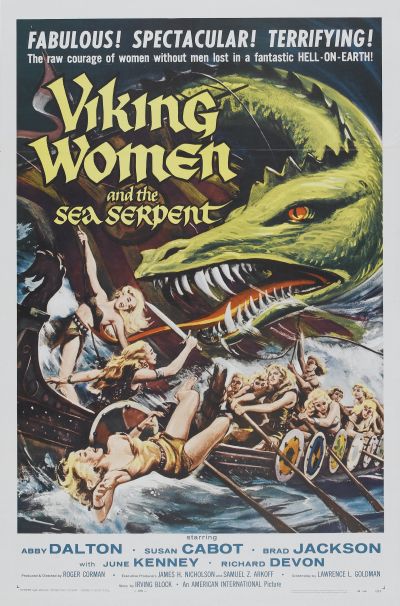 I can see why, purely for reason of brevity, the title above was preferred to the full one of The Saga of the Viking Women and Their Voyage to the Waters of the Great Sea Serpent, even though the latter is more accurate. For the Sea Serpent has a supporting role here, met once on their way in, and again on the way out – it’s much more about what happens in the middle. Three years after their men left, the women of the Stannjold clan leave their shores under the command of Desir (Dalton), trying to find out what happened to them. Encounter #1 with the monster leads them to be shipwrecked on the same shores of the Grimault tribe as their menfolk, whose king, Stark (Devon), has set them to work as slaves in his mines. After initially appearing to welcome the women, it becomes clear that Stark has plans for the new arrivals as well. Viking high-priestess Enger (Cabot) has her own agenda, however: having set her eyes both on Desir’s husband and, for more immediate and pragmatic reasons, Stark, she sabotages Desir’s first attempt to free the men.
I can see why, purely for reason of brevity, the title above was preferred to the full one of The Saga of the Viking Women and Their Voyage to the Waters of the Great Sea Serpent, even though the latter is more accurate. For the Sea Serpent has a supporting role here, met once on their way in, and again on the way out – it’s much more about what happens in the middle. Three years after their men left, the women of the Stannjold clan leave their shores under the command of Desir (Dalton), trying to find out what happened to them. Encounter #1 with the monster leads them to be shipwrecked on the same shores of the Grimault tribe as their menfolk, whose king, Stark (Devon), has set them to work as slaves in his mines. After initially appearing to welcome the women, it becomes clear that Stark has plans for the new arrivals as well. Viking high-priestess Enger (Cabot) has her own agenda, however: having set her eyes both on Desir’s husband and, for more immediate and pragmatic reasons, Stark, she sabotages Desir’s first attempt to free the men. Star Jill Kelly is an adult actress. I mention this, because it seems highly likely that most of her 300+ other works – perhaps The Butt Sisters Do Philadelphia or Sodomania: Slop Shots 5 – are likely better scripted, filmed, edited and generally well-made than this dreadful piece of crap. I should have known, given Donald G. Jackson’s involvement – he’s probably the worst film-maker I’ve ever had the misfortune to encounter, and I speak as someone fully familiar with the works of Ed Wood, Andy Milligan, J.P. Simon and Uwe Boll. They are all pretenders beside Jackson, and even though this barely runs an hour, your patience will be sorely tried. And by “tried”, I mean at the level where gnawing a limb off to escape will seems credible.
Star Jill Kelly is an adult actress. I mention this, because it seems highly likely that most of her 300+ other works – perhaps The Butt Sisters Do Philadelphia or Sodomania: Slop Shots 5 – are likely better scripted, filmed, edited and generally well-made than this dreadful piece of crap. I should have known, given Donald G. Jackson’s involvement – he’s probably the worst film-maker I’ve ever had the misfortune to encounter, and I speak as someone fully familiar with the works of Ed Wood, Andy Milligan, J.P. Simon and Uwe Boll. They are all pretenders beside Jackson, and even though this barely runs an hour, your patience will be sorely tried. And by “tried”, I mean at the level where gnawing a limb off to escape will seems credible.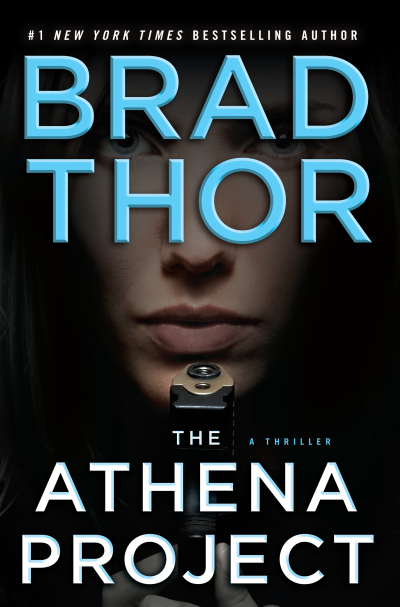 I first became aware of this novel through an article back in February about MMA champion Ronda Rousey and
I first became aware of this novel through an article back in February about MMA champion Ronda Rousey and 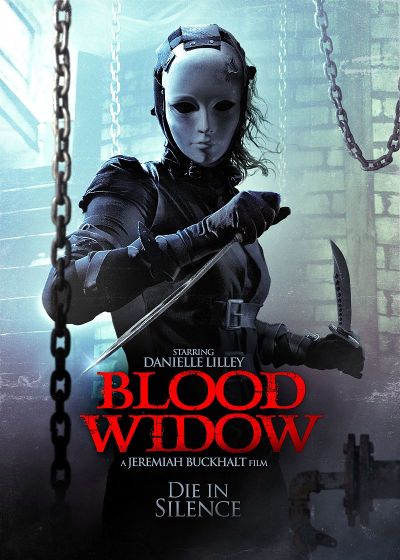 In the slasher genre of horror, the perpetrators seem almost exclusively male: Michael Myers, Jason Vorhees, Freddy Krueger, etc. Women can play an important role, and we’ve covered some of them here before – but it’s much more often as the “final girl”, than the one wielding the machete. However, it’s often forgotten that, in the original Friday the 13th movie, the killer was not Jason, but his mother, so there is some precedent for the female antagonist. See also Nurse 3D, American Horror Story: Coven or perhaps best of all,
In the slasher genre of horror, the perpetrators seem almost exclusively male: Michael Myers, Jason Vorhees, Freddy Krueger, etc. Women can play an important role, and we’ve covered some of them here before – but it’s much more often as the “final girl”, than the one wielding the machete. However, it’s often forgotten that, in the original Friday the 13th movie, the killer was not Jason, but his mother, so there is some precedent for the female antagonist. See also Nurse 3D, American Horror Story: Coven or perhaps best of all,  While twice as long as the first series, at 12 episodes rather than six, I can’t say it’s actually any better. Indeed, I think the dilution of the main element which was so much fun the first time round – the relationship between the two, disparate hitwomen, Roxie (Osment) and Veronica (Chriqui) – leaves this season less entertaining. Yes, it’s bigger and more exotic: but it feels spread thinner, to the detriment of the core aspects. The story takes up shortly after the events of the first series, with V+R in the Caribbean, waiting to get their share of the money from Eileen (Missi Pyle) and Mother (Gershon). But instead, an assassination squad is sent to get them, kicking off a reunion with Veronica’s “parents”, a deranged killer who thinks Roxie is his dead wife, a rogue CIA operative who sends Frank Barnes (Arquette) after Mother, and so on. It builds to a climax where Veronica, previously injected with a lethal nanobot virus that’s about to go off, takes part in an underground death match at a cockfighting arena, to prove her love for the deranged killer. I shit you not.
While twice as long as the first series, at 12 episodes rather than six, I can’t say it’s actually any better. Indeed, I think the dilution of the main element which was so much fun the first time round – the relationship between the two, disparate hitwomen, Roxie (Osment) and Veronica (Chriqui) – leaves this season less entertaining. Yes, it’s bigger and more exotic: but it feels spread thinner, to the detriment of the core aspects. The story takes up shortly after the events of the first series, with V+R in the Caribbean, waiting to get their share of the money from Eileen (Missi Pyle) and Mother (Gershon). But instead, an assassination squad is sent to get them, kicking off a reunion with Veronica’s “parents”, a deranged killer who thinks Roxie is his dead wife, a rogue CIA operative who sends Frank Barnes (Arquette) after Mother, and so on. It builds to a climax where Veronica, previously injected with a lethal nanobot virus that’s about to go off, takes part in an underground death match at a cockfighting arena, to prove her love for the deranged killer. I shit you not.
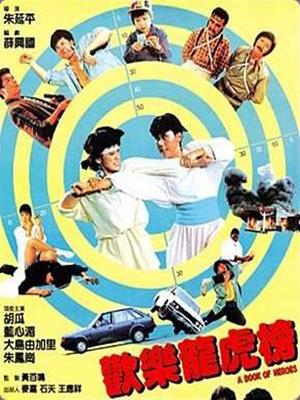 The ranking here would probably be at least half a star higher, if I had the slightest freakin’ clue what’s going on here. For this has truly the worst subtitling I’ve seen in a quarter century of watching Hong Kong action films, with text that is entirely illegible more often than not. You’re left trying to piece together the plot, based on fragments of sentences and on-screen action, which significantly subtracts from the entertainment value. Good thing we have the Internet, and can turn to that for a coherent synopsis of proceedings, that will shine some light on who was doing what to whom, and why.
The ranking here would probably be at least half a star higher, if I had the slightest freakin’ clue what’s going on here. For this has truly the worst subtitling I’ve seen in a quarter century of watching Hong Kong action films, with text that is entirely illegible more often than not. You’re left trying to piece together the plot, based on fragments of sentences and on-screen action, which significantly subtracts from the entertainment value. Good thing we have the Internet, and can turn to that for a coherent synopsis of proceedings, that will shine some light on who was doing what to whom, and why.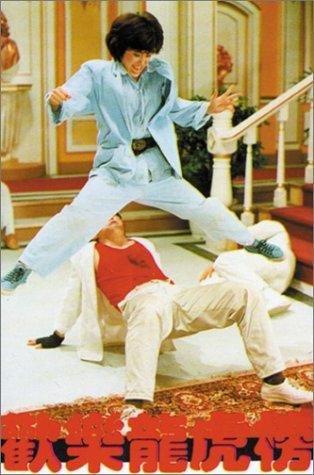 Well, crap. I was following that, right up to “batch of gold”.
Well, crap. I was following that, right up to “batch of gold”.